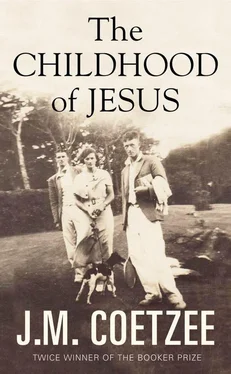‘Therefore if I were to transfer to Wharf Seven or Wharf Nine I would have an easier time. I could take whole weeks off work.’
‘Correct. If you worked on Seven or Nine you would have an easier time. But you would also not have a full-time job. So, on the whole, you are better off on Two.’
‘I see. So it is for the best, after all, that I am here, on this wharf, in this port, in this city, in this land. All is for the best in this best of all possible worlds.’
Álvaro frowns. ‘This isn’t a possible world,’ he says. ‘It is the only world. Whether that makes it the best is not for you or for me to decide.’
He can think of several replies, but refrains from airing them. Perhaps, in this world that is the only world, it would be prudent to put irony behind him.
As he promised, Álvaro has been teaching the boy chess. When work is slack, they can be seen hunched over a pocket set in some patch of shade, absorbed in a game.
‘He has just beaten me,’ reports Álvaro. ‘Only two weeks and already he is better than me.’
Eugenio, the most bookish of the stevedores, issues the boy with a challenge. ‘A lightning game,’ he says. ‘We each have five seconds to make our move. One-two-three-four-five.’
Ringed by spectators, they play their lightning game. In a matter of minutes the boy has Eugenio backed into a corner. Eugenio gives his king a tap and it falls on its side. ‘I’ll think twice before taking you on again,’ he says. ‘You’ve got a real devil in you.’
In the bus that evening he tries to discuss the game, and Eugenio’s strange remark; but the boy is reticent.
‘Would you like me to buy you a chess set of your own?’ he offers. ‘Then you can practise at home.’
The boy shakes his head. ‘I don’t want to practise. I don’t like chess.’
‘But you are so good at it.’
The boy shrugs.
‘If one is blessed with a talent, one has a duty not to hide it,’ he presses on doggedly.
‘Why?’
‘Why? Because the world is a better place, I suppose, if each of us can excel at something.’
The boy stares moodily out of the window.
‘Are you upset about what Eugenio said? You shouldn’t be. He didn’t mean it.’
‘I’m not upset. I just don’t like chess.’
‘Well, Álvaro will be disappointed.’
The next day a stranger makes his appearance at the docks. He is small and wiry; his skin is burned a deep walnut shade; his eyes are deep set, his nose hooked like a hawk’s beak. He wears faded jeans streaked with machine oil, and scarred leather boots.
From his breast pocket he takes a scrap of paper, hands it to Álvaro, and without a word stands staring into the distance.
‘Right,’ says Álvaro. ‘We will be unloading for the rest of the day and most of tomorrow. When you are ready, join the line.’
From the same breast pocket the stranger produces a pack of cigarettes. Without offering it around, he lights himself one and takes a deep puff.
‘Remember,’ says Álvaro, ‘no smoking on the hold.’
The man gives no sign that he has heard. Tranquilly he gazes around. The smoke from his cigarette rises into the still air.
His name, Álvaro lets it be known, is Daga. No one calls him anything else, not ‘the new man’, not ‘the new guy’.
Despite his small stature, Daga is strong. He staggers not a millimetre when the first sack is dropped onto his shoulders; he ascends the ladder swiftly and steadily; he lopes down the gangplank and heaves the sack into the waiting cart with no sign of effort. But then he retreats into the shadow of the shed, squats on his heels, and lights another cigarette.
Álvaro marches up to him. ‘No breaks, Daga,’ he says. ‘Get on with it.’
‘What’s the quota?’ says Daga.
‘There is no quota. We are paid by the day.’
‘Fifty sacks a day,’ says Daga.
‘We move more than that.’
‘How many?’
‘More than fifty. No quota. Each man carries what he can.’
‘Fifty. No more.’
‘Get up. If you have to smoke, wait for the break.’
Things come to a head at noon that Friday, when they are being paid. As Daga approaches the wooden board that serves as a table, Álvaro leans down and whispers in the paymaster’s ear. The paymaster nods. He sets Daga’s money on the board before him.
‘What’s this?’ says Daga.
‘Your pay for the days you have worked,’ says Álvaro.
Daga picks up the coins and with a quick, contemptuous movement flings them back in the paymaster’s face.
‘What’s that for?’ says Álvaro.
‘Rat’s wage.’
‘That’s the rate. That’s what you earned. That’s what we all earn. Do you want to say we are all rats?’
The men crowd around. Discreetly the paymaster shuffles his papers together and closes the lid of his cashbox.
He, Simón, feels the boy gripping his leg. ‘What are they doing?’ he whines. His face is pale and anxious. ‘Are they going to fight?’
‘No, of course not.’
‘Tell Álvaro not to fight. Tell him!’ The boy tugs at his fingers, tugs and tugs.
‘Come, let’s move away,’ he says. He draws the boy towards the breakwater. ‘Look! Do you see the seals? The big one with his nose in the air is the male, the bull seal. And the others, the smaller ones, are his wives.’
From the crowd comes a sharp cry. There is a flurry of motion.
‘They are fighting!’ whines the boy. ‘I don’t want them to fight!’
A half-circle of men has formed around Daga, who crouches down, a faint smile on his lips, one arm stretched forward. In his hand glints the blade of a knife. ‘Come!’ he says, and makes a beckoning motion with the knife. ‘Who is next?’
Álvaro sits on the ground, hunched over. He seems to be clutching his chest. There is a streak of blood on his shirt.
‘Who is next?’ repeats Daga. No one stirs. He comes erect, folds the knife, slips it into his hip pocket, lifts the cashbox, upends it on the board. Coins shower everywhere. ‘Pussies!’ he says. He counts out what he wants, gives the drum a derisory kick. ‘Help yourselves,’ he says, and turns his back on the men. Leisurely he mounts the paymaster’s bicycle and pedals away.
Álvaro gets to his feet. The blood on his shirt comes from his hand, oozing from a slash across the palm.
He, Simón, is the senior man or at least the eldest: he should take the lead. ‘You need a doctor,’ he tells Álvaro. ‘Let’s go.’ He gestures to the boy. ‘Come — we are going to take Álvaro to the doctor.’
The boy does not stir.
‘What’s wrong?’
The boy’s lips move but he can hear no word. He bends closer. ‘What’s wrong?’ he asks.
‘Is Álvaro going to die?’ whispers the boy. His whole body is rigid. He is shivering.
‘Of course not. He has a cut on his hand, that’s all. He needs a plaster to stop the bleeding. Come. We will take him to the doctor and the doctor will fix him up.’
In fact Álvaro is already on his way, accompanied by another of the men.
‘He was fighting,’ says the boy. ‘He was fighting and now the doctor is going to cut off his hand.’
‘Nonsense. Doctors don’t cut off hands. The doctor is going to wash the cut and put a plaster on it, or maybe sew it shut with needle and thread. Tomorrow Álvaro will be back at work and we will have forgotten all about it.’
The boy stares at him piercingly.
‘I am not fibbing,’ he says. ‘I would not fib to you. Álvaro’s wound is not serious. That man, señor Daga or whatever his name is, didn’t mean to hurt him. It was an accident. The knife slipped. Sharp knives are dangerous. That is the lesson to remember: not to play with knives. If you play with knives you can get hurt. Álvaro got hurt, fortunately not seriously. And señor Daga has left us, taken his money and gone. He won’t be back. He didn’t belong here, and he knows it.’
Читать дальше












